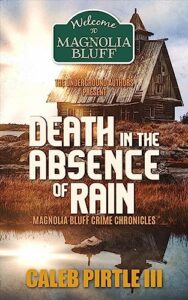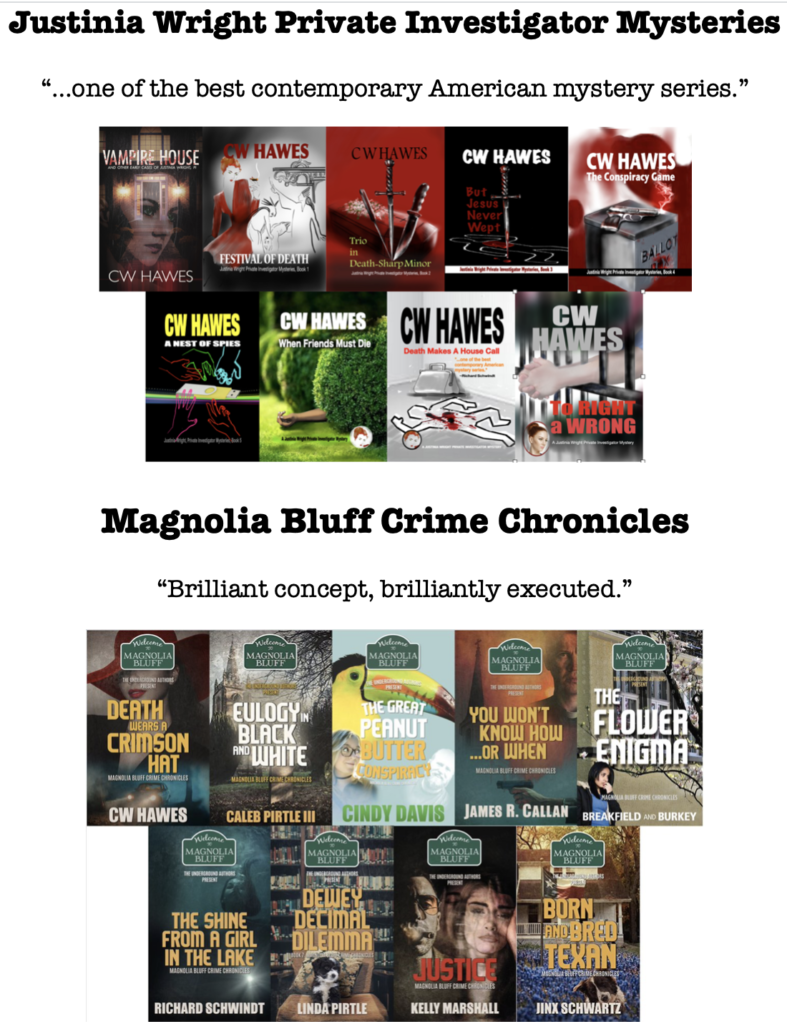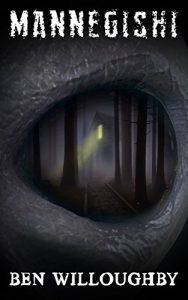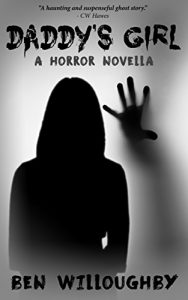Writing one bullet at a time.
—Caleb Pirtle III
In this age of hyper-narcissism, Caleb Pirtle was that most rare of human beings: a selfless man.
His passing has left a huge hole in the writing community. Yet, he continues to speak to us. He does so through his books.
And what you find in his books is a man with an incredibly deep well.
He knew life. He knew people. He knew the nastiness and he knew the sublime. His years of talking to people and observing them comes through when he tells his stories. They are always about people and what they do and don’t do. The lies they tell and don’t tell.
Caleb’s writing was always centered around the human factor. Fiction, or non-fiction. Didn’t matter. People were at the center.
He used to say he was writing one bullet at a time. That bullet could be literal or metaphorical. And its impact depended on where it hit. And how hard. Literally or metaphorically.
He was an incredibly optimistic man. If you talked with him, as the song goes, never was heard a discouraging word, and the skies were not cloudy all day.
Yet, Caleb was no Pollyanna. There is a darkness to his Magnolia Bluff books that is not present in any of the other books I’ve read. And that might be due to the Magnolia Bluff stories being told in the first person. They are told by a person who has seen a lot of life. And a lot of it wasn’t good. Or especially nice.
I have found that third person puts distance between writer and reader. First person erases that distance. The first person story is intensely intimate.
And it is that intimacy that gives his Magnolia Bluff books such incredibly deep insights into human nature.
I find the last five lines of Death in the Absence of Rain enigmatic. I’m not sure what they mean, and I didn’t get a chance to ask Caleb.
Graham Huston, the narrator of the story, says:
We as a people are what we bury inside of us.
I believe it with all my heart.
Don’t know about you.
But, frankly, I’ve buried about all I can bury.
I’m running out of room.
There’s an observation about people in general. Then there is the application by Graham to himself.
That is one doggone penetrating bullet.
We are what we bury inside of us.
Death in the Absence of Rain is a book about lies. Lies we tell others and lies we tell ourselves.
It’s a theme Caleb explored in Last Deadly Lie. 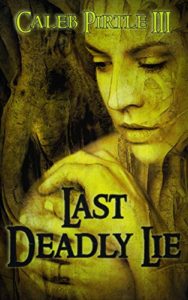
There is a darkness that surrounds us. All of us. Even so, Caleb chose to see what was good and positive — even if he had to rummage around in that darkness for a while to find it.
Caleb was a pantser. Pull up a blank Word doc — and start typing. The story will flow from the subconscience, through the fingers, and onto the page.
The downside to being a pantser is that there are usually no notes or outlines lying around. Which means we will never know if Graham found a way to make more room, or somehow stopped burying.
We are what we bury inside of us.
Graham was burying a lot of crap. Most of us are.
I don’t think Caleb was.
Just a day or two before he went into the hospital, I spoke with him on the phone. He was optimistic as ever, even though he was in great pain. He was looking forward to conquering whatever the heck was the problem and getting back into the saddle.
We are what we bury inside of us.
Unlike Graham Huston, but very much like Caleb Pirtle, I hope I’m burying good stuff.
I want to end my days looking to get back into the saddle.
If you missed the Underground Authors tribute to Caleb, take a watch here: https://www.youtube.com/watch?v=trjgrs0Qkwk
May we all take a life lesson from Caleb Pirtle. Write one bullet at a time. And do our darnedest to get back into the saddle.
Comments are always welcome! And until next time, happy reading!
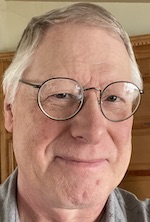 CW Hawes is a playwright; award-winning poet; and a fictioneer, with a bestselling novel. He’s also an armchair philosopher, political theorist, social commentator, and traveler. He loves a good cup of tea and agrees that everything’s better with pizza.
CW Hawes is a playwright; award-winning poet; and a fictioneer, with a bestselling novel. He’s also an armchair philosopher, political theorist, social commentator, and traveler. He loves a good cup of tea and agrees that everything’s better with pizza.
If you enjoyed this post, please consider buying me a cup of tea. Thanks! PayPal.me/CWHawes
Share This!